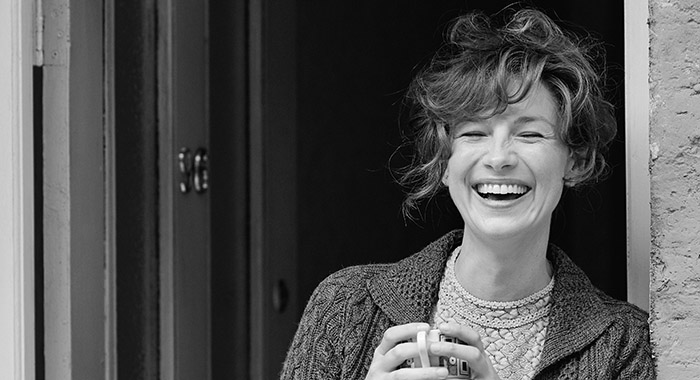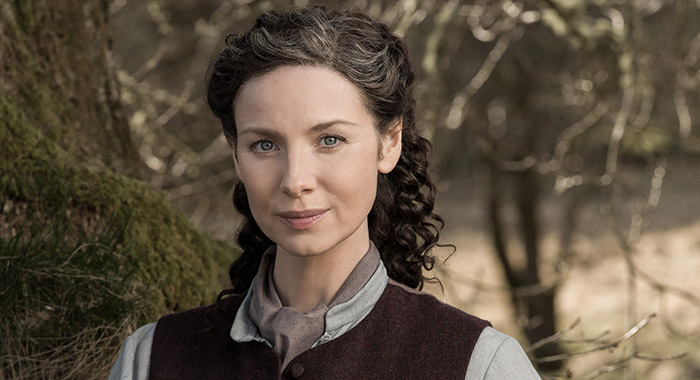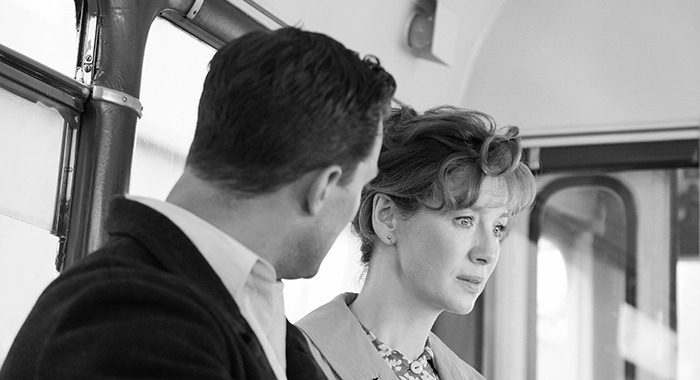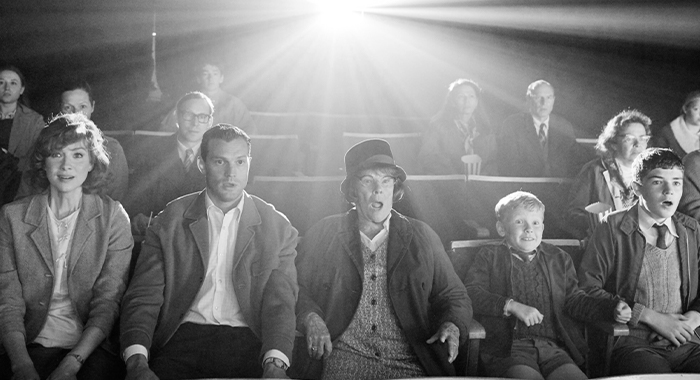TAGGED AS: Academy Awards, Drama, Film, movies, Oscars

(Photo by Rob Youngson/Focus Features)
Rotten Tomatoes’ “Get To Know Your Nominees” series will provide an in-depth look at one nominee from each of the major awards categories – the four acting categories, and directing – diving into their highest-rated work from both fans and critics, essential titles from their filmography, and featuring thoughts on their nominated film drawn from an extended interview.
She swears it’s unintentional, but Caitríona Balfe has found a niche in playing strong-willed and opinionated women. She’s known to TV audiences for her work on Starz’s Outlander, playing the smart and outspoken time-traveling Claire Fraser, a medic with a strong knowledge of history. (Penicillin — what a concept!) As Mollie Miles in Academy Awards–nominated drama Ford v Ferrari, she had a need for speed almost as strong as her race car–driver husband (played by Christian Bale). And in this year’s Belfast, she plays Ma — the mother of two boys and the backbone of a working-class Northern Irish family who always looks stylish whether she’s hiding from the rent man or cutting a rug at a Sunday party with the extended family.
Balfe says it’s a “lovely gift” as an actor and as a woman to see a character be a mother and be a wife, but also “an individual who has these quirks and also these fears.” This character is particularly special because she’s based on writer-director Kenneth Branagh’s memories of his own childhood.
“This is something Ken spoke about: his mom had a sort of ‘fizziness’ to her,” Balfe says. “She had a vibrancy. And loved to dance; loved to sing. She loved her fashion. And these were all parts of her that lived very strongly even though she was going through all these stresses and strains.”
The film is known for its music choices, be it native son Van Morrison’s songs cuing certain scenes or a cover of Robert King’s “Everlasting Love” at a pivotal moment at the end where Balfe particularly sparkles.
But that’s not the only time she’s shone on screen.
Balfe, who is Irish, tells Rotten Tomatoes of Belfast that “there’s something extra special about telling a story from home.”
“In the beginning [of filming], we all felt that it was a very specific story about Belfast, about Northern Ireland, and about the Irish experience,” she says. “But obviously, what we’ve discovered within that is this message about kindness, the love of family, and the love of community — and tolerance, which is hugely important.”
“Nowadays, especially, we’ve all lived through the experience of what happens when tribalism is allowed to erupt over into violence,” she says. “And when communities are separated and split like that, it is incredibly difficult to reunite them or to overcome those differences or those grievances.”

(Photo by Everett Collection)
The theme of tribalism and violence appears in her Golden Globe–nominated work in Starz’s historical romantic drama Outlander. Based on Diana Gabaldon’s best-selling novels, Balfe plays Claire, an outspoken World War II nurse who travels through time to 1700s Scotland and falls for Highland warrior Jamie Fraser (Sam Heughan). Complicating the matter is that her original husband from before her time traveling, Tobias Menzies’ Frank, is the descendant of (and looks just like!) nefarious British army officer Jonathan Wolverton “Black Jack” Randall.
Throughout the Ronald D. Moore–created show (which premieres its sixth season on March 6), Claire has seen plenty of bloodshed in the name of god and country. She’s tried to thwart the Jacobite Rising and help Africans enslaved by American plantation owners and is a participant in the dawning of the American Revolutionary War.
Balfe says Ma and Claire differ. For the former, “it’s very difficult for her to imagine anything beyond” Belfast, which is “the complete opposite to Claire — thrusting herself into the unknown is very much the backbone of her character.”

(Photo by Robert Wilson/Starz)
Claire can teleport through time but she doesn’t remain the same age throughout the show. Over the seasons, Balfe’s character aesthetic has included age makeup and wigs with grey streaks — not things you normally see in a romance story.
“One of the great things that Diana chose to explore is the enduring love of a marriage,” Balfe says.”This love story, more or less starts with them getting married, and then we follow their journey of how they stay together.”
She says it’s “been incredible…to inhabit this vastness of a woman’s experience in that way” and go from “a woman from her early 30s, and she’s now getting close to 60.
“I made a decision that Claire was going through menopause last year,” she says. “Because it helped feed into a lot of her insecurities as a woman because she’d always been someone who’s had unwavering confidence.”
To that note, Outlander has always been groundbreaking for its take on the female gaze when it comes to its intimate sex scenes. That hasn’t stopped as Claire and Jamie have aged, and Balfe says that “we’re telling the story of a woman in her late 50s who still has an active sex life and is still a sexual being.
“I do think it’s an important thing to look at a woman and her sexual appetite and her desires and all these things and allow her to fo feel these things unapologetically,” Balfe says. “Instead of just being the object or the recipient of things, she’s an active pursuer.”
In director James Mangold’s 2019 racing drama, Ford v Ferrari, Balfe’s Mollie is wife to Bale’s race-car driver Ken Miles. She talks as fast as her husband drives and knows how to shift a few gears of her own.
“Molly Miles was was such a fun character. I mean, she was definitely the feisty backbone of that household,” Balfe says.
She particularly likes a scene in which the couple are fighting in a car about Ken’s latest job opportunity — and it’s Mollie who drives both the car and the action of the scene.

(Photo by Searchlight Pictures)
“As an actor, you want to be able to have some really fun scenes that you can really go for and having an acting parter like Christian Bale — those are all on your bucket list things,” Balfe says.
She says the film also opened up a lot of doors for her in her career. People knew her from Outlander, and she had a small selection of film credits, but she says, “When you get a role like that — and it’s not a huge role, but it’s alongside a great caliber of other actors — and the film is successful, people see you in a different light.”
As far as how these strong women compare to Balfe herself, she laughs, “I’m probably a bit mousy in my own real life … I like playing these women who fight for what they believe in.”
Outlander isn’t Balfe’s only notable TV part. She also voiced the character of Tavra in The Dark Crystal: Age of Resistance, Netflix’s much-beloved but ultimately canceled puppetry series. Balfe, who was a fan of the original Jim Henson and Frank Oz movie The Dark Crystal, says the experience of making this show was freeing because it was “one of those fun voiceover things where you get to stand in a booth and make silly faces and voices and and no one else could really see you do it.” She loved it and says she “100-percent” wants to do more voiceover work, not only because it’s fun, but because “it’s a total different skill set.”
“So much communication is through physical action as well and this is just purely voice,” she says. “So you have to animate and throw your voice and find ways of inflicting emotion. It’s a really fun puzzle.”
Dark Crystal also gave Balfe a chance — again — to shape-shift her voice from her regular Irish dialect.
“I find it really quick to find the character [though accent work], because you’re doing a different voice to your own,” she explains. “It’s much easier for me to separate myself and step in and out of it. It’s that instant thing that makes you a different person.” (Or, in the case of Dark Crystal, a Gelfling).

(Photo by Netflix)
The Dark Crystal TV series was directed by Louis Leterrier, a friend of Balfe who cast her in her first major movie role, playing the partner to Michael Caine’s wealthy insurance magnate in the magic-themed heist movie Now You See Me. While Balfe’s screen time was minimal — she says her family’s joke is that “you don’t ever really see me” — the movie did give her lots of on-set experience and a chance to spend three weeks in New Orleans working on a major film.
One of Balfe’s few roles in a modern-day set film where you can actually see her is director Jodie Foster’s 2016 thriller Money Monster, where George Clooney plays the host of a financial news program who is held at gunpoint on live TV. Balfe plays an IBIS chief communications officer who tries to negotiate the situation. Balfe says she loved working with Foster and the cast, which also included Julia Roberts, Jack O’Connell, and Dominic West. But she also liked that the film “had social commentary” (with Outlander and Belfast, this is clearly a theme in her work).

(Photo by Soney Pictures)
“I’d love to do more contemporary things,” she says. “It’s funny; I think sometimes you do a period thing and then you only really get offered period things. But there’s something really, really nice about being able to dress yourself when you’re going into your character and not having to have all of these period pieces laid out for you.”
Balfe also has a background in runway modeling and once even appeared in a Victoria’s Secret show.
“I was modeling in a time when it was right after a Brazilian wave of these gorgeous Amazonian goddesses, and there was a real wave of more androgynous-sort of Belgian and French girls, and I somehow within that mix. I think Victoria’s Secret was trying to change their image for a season,” Balfe says.
When asked if she’d model again, Balfe says that’s unlikely.
“I did it once. It was a mental experience. I had so many spray tans, and I still was the whitest person in the room,” Balfe laughs, recalling the experience of doing the Victoria’s Secret show. And did modeling offer any confidence to Balfe when she started acting? She emphatically says “No.”
“Maybe there are some people who come out of that world as confident people, but I actually think it does the opposite to you,” she says. “I think there’s so much scrutiny on just how you look that it generally makes everybody incredibly insecure.
“I think what is beautiful about acting is that you’re never — or you should never — be conscious about how you look,” she adds. “You’re dealing with people’s internal worlds and a connection between you and whoever you’re playing in the scene with.”
She’s one of the most talked-about characters of the award season and we don’t even know her real name.
In Belfast, writer-director Branagh’s ode to his experiences witnessing The Troubles between Protestants and Catholics in 1960s Northern Ireland, Balfe plays a character simply known as “Ma.” A version of Branagh’s own strong-willed, stylish, and secretly terrified working-class mother, this lady of the house expects no talking back from her two young boys, Buddy (Jude Hill) and Will (Lewis McAskie), while her husband (Jamie Dornan’s “Pa”) looks for work in London. But Ma also has no qualms about sharing her own feelings, be it the double standard of sending her boys to church though she doesn’t attend herself or hiding from the rent man but also chastising Buddy for stealing a candy bar from the local drug store.

(Photo by Focus Features)
There’s also a restraint to Ma. She attempts to hide her fear about not only what’s going on with her family’s finances, but also the powderkeg political situation outside of their small home from her two young boys. In one scene, Buddy sits in the shadows as he listens to his mother get a disturbing phone call, and she retains her composure because she knows that, somewhere the house, little ears are listening. Another time, Ma multi-tasks by sitting on a bus to talk with Pa about whether they have a future in Belfast while simultaneously keeping one eye on Buddy, who stands on the street outside and may get into mischief.
“Having that constant presence of the children in the house, it forces you to keep so many things under your lids,” Balfe says. “Everything has to kept calm. You might be frustrated and you might be angry. But you have to just keep a lid on it until there’s one or two scenes where then she just does explode and it becomes undeniable, her anger.”

(Photo by Focus Features)
Ma’s explosions are also sometimes ones of joy. Through Buddy’s eyes, his parents loved to cut a rug — even at a funeral. In the film’s most memorable scene, Dornan’s Pa serenades his wife with a version of Robert King’s “Everlasting Love” before they embrace in a moment that would have made Dirty Dancing stars Patrick Swayze and Jennifer Grey and choreographer Kenny Ortega proud. Balfe says neither she nor Dornan knew their dance number would be such a focus of the scene when they first read the script, but that the film’s choreographer, Aletta Collins, found a way to both offer a gift to viewers who themselves love to dance and also would be “slightly heightened; that it’s Buddy’s memory of how glamorous his parents were.”
She adds that it’s a very Irish thing for funerals to turn into dance parties: “We start off with some mournful songs. But very quickly, these gatherings turn into celebrations of somebody’s life and celebrations of life. That’s something that Ken really wanted to showcase; that in the midst of all of this, people still lived these very vibrant lives.”
Belfast is currently screening in theaters and available in VOD. Among its many accolades, it has garnered Caitríona Balfe a Screen Actors Guild Award nomination for best-supporting actress. The Screen Actors Guild Awards will be broadcast at 8 p.m. E.T. on February 27 on TNT an and TBS.